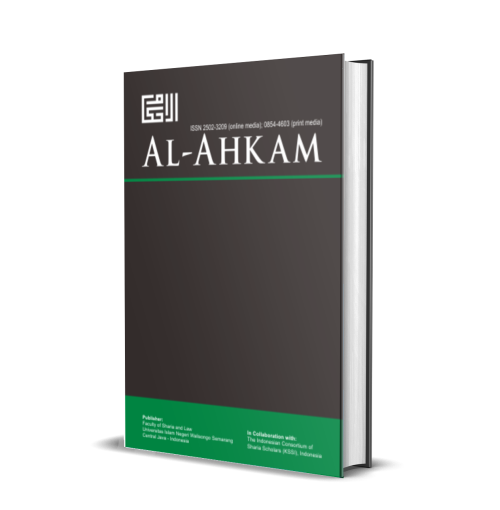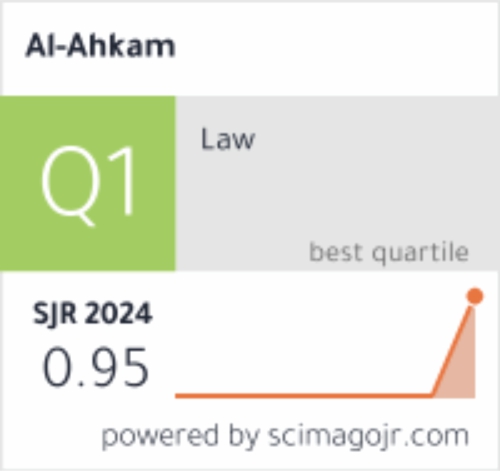KONSEP AHLI WARIS DAN AHLI WARIS PENGGANTI: Studi Putusan Hakim Pengadilan Agama
DOI:
https://doi.org/10.21580/ahkam.2017.27.1.1051Keywords:
religious court, substitute heirs, compilation of islamic lawAbstract
There is a fundamental difference between the rules in Islamic inheritance jurisprudence with the rules of inheritance in the Compilation of Islamic Law. Islamic inheritance jurisprudence rules, on one hand, give inheritance rights to those who are still alive at the time of the testator died. On the other hand, the rules of inheritance in the Compilation of Islamic Law, as defined in Article 171 (c), give inheritance rights to the person who died earlier than the testator, as an attempt to legitimize "substitute heirs" under Article 185 paragraph (1). This difference was not known by the judges in the Religious Courts that have implemented the Compilation of Islamic Law as one source of their substantive laws. This study revealed that in its decision on the case of inheritance proved that the Judges concerned unconsciously, others with skepticism, citing the aforementioned article as one aspect of their legal considerations in determining the beneficiary status of the applicants/plaintiffs, even if the applicant/plaintiff was is "a direct heir" of the testator. Consequently, the resulting verdict is not supported by proper legal considerations.
[]
Ada perbedaan yang mendasar antara aturan waris dalam Ilmu Faraid dengan aturan waris dalam Kompilasi Hukum Islam. Aturan waris Ilmu Faraid memberikan hak waris kepada orang yang masih hidup di saat pewaris meninggal dunia. Sebaliknya, aturan waris Kompilasi Hukum Islam, sebagaimana ditetapkan dalam Pasal 171 huruf (c), memberikan hak waris kepada orang yang meninggal dunia lebih dahulu daripada si pewaris, sebagai upaya melegitimasi “ahli waris pengganti” yang diatur dalam Pasal 185 ayat (1). Perbedaan ini telah luput dari pengamatan para Hakim di lingkungan Peradilan Agama yang telah lama menerapkan Kompilasi Hukum Islam sebagai salah satu sumber hukum materiilnya. Penelitian ini mengungkapkan bahwa dalam sejumlah putusan waris tampak majelis Hakim yang menangani perkara waris tanpa sadar, sebagian lainnya dengan keraguan, mengutip pasal tersebut sebagai salah satu aspek pertimbangan hukum mereka dalam menetapkan status keahliwarisan para pemohon/ penggugat, sekalipun para pemohon/penggugat itu adalah “ahli waris langsung” dari si pewaris. Akibatnya, diktum putusan yang dilahirkan tidak didukung oleh pertimbangan hukum yang benar.Downloads
References
Arto, Mukti, Hukum Waris Bilateral dalam Kompilasi Hukum Islam, Solo: Balqis Queen, 2009.
Athoillah, Fikih Waris (Metode Pembagian Waris Praktis), Bandung: Yrama Widya, 2013.
Basyir, Ahmad Azhar, Hukum Waris Islam, Yogyakarta: UII Press, 2001.
Hazairin, Hukum Kewarisan Bilateral, Jakarta: Tintamas, 1982.
Hajar M, “Asal Usul Ahli Waris Pengganti dan Implementasi Ahli Waris Pengganti Perspektif Hukum Islam”, dalam Asy-Syir’ah Jurnal Ilmu Syari’ah dan Hukum Vol. 50 No.1 Juni 2016.
__________, “Epistemologi Ahli Waris Pengganti dalam Kompilasi Hukum Islam”, dalam Millah Vol. XIV No.1 Agustus 2014.
Instruksi Presiden Nomor 1 Tahun 1990 tentang Kompilasi Hukum Islam.
Pedoman Teknis Administrasi dan Teknis Peradilan Agama (Buku II). Jakarta: Direktorat Jenderal Badan Peradilan Agama, 2010.
Penetapan Nomor 041/Pdt.P/2013/PA.Pdlg.
Penetapan Nomor 049/Pdt.P/2012/PA.Pas.
Penetapan Nomor 102/Pdt.P/2013/PA.Plh.
Permasalahan Hukum pada Pengadilan Tinggi Agama Se-Indonesia dan Mahkamah Syar’iyah Aceh (Hasil Rakernas Tahun 2011).
Putusan Nomor 17/Pdt.G/2012/PA.Sgr.
Putusan Nomor 186/Pdt.G/2012/PA.Bji.
Putusan Nomor 443/Pdt.G/2013/PA.Mdn.
Putusan Nomor 809/Pdt.G/2012/PA.Pdg.
Al-Qur’an dan Terjemahnya.
Rahman, Fatchur, Ilmu Waris, Bandung: al-Ma’arif, 1981.
Rasyid, Roihan A., artikel “Pengganti Ahli Waris dan Wasiat Wajibah” dalam buku Cik Hasan Bisri (Penyunting), Kompilasi Hukum Islam dan Peradilan Agama dalam Sistem Hukum Nasional, Jakarta: Logos Wacana Ilmu, 1999.
Rumusan Hasil Diskusi Komisi II Bidang Urusan Lingkungan Peradilan Agama (Hasil Rakernas Tahun 2010).
Zuhrah, Fatimah, “Ahli Waris Pengganti dan Pembaruan Hukum Kewarisan Islam Indonesia: Kajian Sosiologis dan Yuridis”, dalam Jurnal Penelitian Medan Agama Vol. 8 No. 2, 2016.
Downloads
Published
How to Cite
Issue
Section
License
By submitting an article to the journal, the author(s) agree to transfer the published article's copyright to the journal, which will act as the publisher. This means the journal will have the right to publish the article in various forms, including reprints. The journal will maintain the publishing rights to the published articles.
In line with the license, authors and third parties (readers, researchers, and others) are allowed to share and adapt the material. In addition, the material must be given appropriate credit, provided with a link to the license, and indicated if changes were made. If authors remix, transform or build upon the material, authors must distribute their contributions under the same license as the original.




